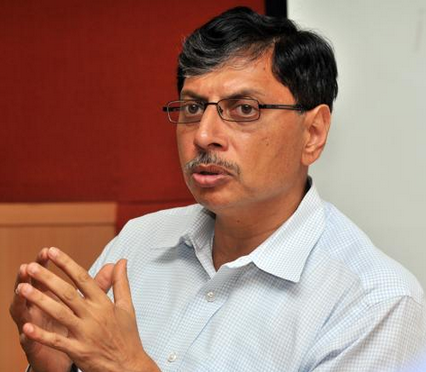Last Updated on: 22nd November 2023, 03:22 am
“Work smarter, not harder.” The old adage continues to inspire many in this age of automation and AI. But according to tech billionaire and father of modern IT services Phaneesh Murthy, the century-old quote doesn’t get it quite right.
When smart people are competing on a global scale, those who work hard will always achieve more and deliver more value than those who don’t, according to Murthy.
In his opinion, the most successful people operate on a philosophy of “work smarter and harder.”
“If you want to create extraordinary or exceptional value, you have to be prepared to work an extraordinary and exceptional amount,” Phaneesh Murthy says.
But it’s not as simple as putting in more hours (though Murthy does recommend long days). Working smarter and harder is about designing organizations around sustainable growth and recycling your surplus hours to maximize value and efficiency. In a recent interview, he discussed his process.
Who is Phaneesh Murthy?
Phaneesh Murthy is one of the most successful and well-respected business leaders of the internet era. He nearly single-handedly defined the modern IT services industry with his disruptive innovations and his unique leadership style.
He led once-miniscule IT businesses Infosys and iGATE to global dominance, and he founded several companies, including the advisory firm Primentor, Inc., where he currently serves as CEO.
Murthy has mentored dozens of senior executives on how to leverage smart and hard work to unlock hyper-growth. With over 30 years of experience transforming businesses, Murthy has one of the most well-rounded perspectives on IT, operations, sales, and leadership—and what aligns them to succeed—in today’s business environment.
“Nobody’s died of hard work”
Phaneesh Murthy learned a valuable lesson from his mother growing up, who often told him, “Nobody’s died of hard work.”
“I’ve always followed that advice,” he recalled. “I’ve worked pretty hard all my life.”
“Pretty hard” may be an understatement. An 80-hour work week has always been the norm for the Indian tech mogul. He attributes this work ethic to his success, even if he now admits that it caused some of his relationships to suffer.
“I mean, if you work 80 hours a week, you’re going to get done more than somebody who works 40 50 hours a week,” he said.
Working hard isn’t just about getting more work done. It’s also about developing expertise that goes above and beyond anyone else in your shoes. Murthy’s long days on the job allowed him to excel not only in his own position (he started in sales) but also to develop a keen understanding of other departments and operations as a whole. This perspective led to the creation of synergistic business models that skyrocketed growth and disrupted the entire IT services industry.
But, Phaneesh Murthy understands that his hard would could have easily been for nothing—if he hadn’t learned to use his time and resources to their greatest effect (AKA working smarter).
Working Smarter, According to Phaneesh Murthy
When you ask someone today what “working smarter” means, they usually talk about automation and delegation. But Phaneesh Murthy disagrees. These concepts are actions leaders take once a foundation of growth and a plan have been developed. They can easily go awry, wasting loads of time and resources, if the “smart” work hasn’t been done beforehand.
According to Phaneesh Murthy, there are three major factors that encourage smart work.
Building the Right Team
Delegating doesn’t accomplish anything if you’re delegating to the wrong people. This is why it’s so critical to build the right team and spend the necessary amount of time doing it. For Phaneesh Murthy, building the right team is the first task—and the most important task—for any start-up or entrepreneurial effort.
“Build a team of like-minded, competent, performance-oriented people with the same work culture,” he said.
Murthy also warned against assembling a team based on friendships or non-work relationships.
“I found significant challenges working with friends, who had very different working styles and work ethics,” Murthy recalled.
For existing businesses, restructuring teams around a shared culture and work ethic may be the key to igniting performance.
Planning for the Future
When structuring a company, it can be easy to focus on short-term deliverables, especially when funds are tight. But this always comes at the cost of future operational efficiency, and may even put companies at risk of collapse.
“Spend a fair amount of time in understanding what the future might entail, and structure your company correctly and accordingly,” Phaneesh Murthy said. “Rather than doing a simple structure now, which will create problems for you later.”
“Growing pains” are seen as a byproduct of success, but they can also hinder a business in a critical growth phase. In the worst cases, a lack of planning for the future can result in sustained operating losses that undermine the ability to scale.
Spending more time preparing during the early stages of a plan will result in exponential time saved in the future and better poise an organization for sustained growth.
Staying Focused on Core Competencies
Companies are founded on strong value propositions, and it’s these core competencies that attract investment. But, as start-ups develop, they often lose sight of their core competencies and lose focus on the value that best aligns with their target market.
“When you start small, there are tendencies to scatter all over the place and spray around with a machine gun,” Phaneesh Murthy said.
Big changes often occur during the early stages of a start-up or transformation, but leaders need to balance creativity with research and planning in order to keep risk in check.
It’s important to anchor new ideas and opportunities to a broader mission and goals. Above all, leadership must be aligned around these core competencies and a clear path to profitability.
Working Smart is Working Hard
Phaneesh Murthy has never thought of hard work and smart work as opposing forces. In reality, they go hand in hand. Working smart requires continuous planning, analysis, innovation, and risk-taking. It also requires good management practices to keep teams in lock-step.
And that’s hard work.
Businesses that leverage hard work and smart work will benefit from efficient, lean operations and the agility needed to react and innovate in fast-paced markets.






